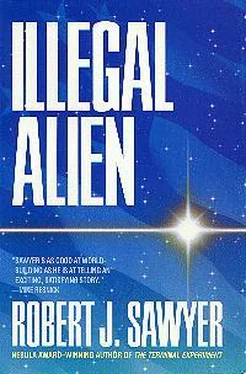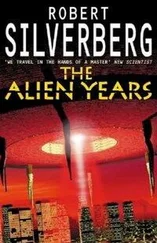“I am looking for it.”
“I do have the term correct, don’t I?” said Dale. “The kivart is the single organ in the Tosok body responsible for producing free-floating nerve bundles?”
“Yes,” said Kelkad. “But I do not see it here.”
“The kivart can be harvested for transplant, can’t it?”
“Yes.”
“In fact, as an organ that a Tosok has only one of, it’s one of the most important ones to harvest, isn’t it?”
“Yes.”
“Indeed, a Tosok can get by for extended periods with only three lungs, no?”
“In fact,” said Kelkad, “in the elderly, the strain of transplanting a fourth lung outweighs the benefits of having it in most cases.”
“Indeed, you can get by, as long as you don’t exert yourself, for an extended period with just two lungs, correct?”
“That is right.”
“And, again so long as one doesn’t exert oneself, three hearts, or even just two, would be enough to allow life to continue, no?”
“That is right.”
“But the kivart —well, if the kivart goes, severe motor-control problems develop almost at once, isn’t that so?”
“Yes,” said Kelkad.
“Indeed, without his or her one and only kivart , a Tosok would die quickly, no?”
“That is correct.”
“And so,” said Dale, “Hask would doubtless have harvested Seltar’s kivart , which, in many ways, is the most crucial of all the organs to recover, and—”
A muffled sound, then Judge Pringle’s voice: “Mr. Rice, caution your client. I will not tolerate outbursts in my courtroom.”
“I’m sorry, Your Honor. Hask, be quiet—”
Hask’s untranslated voice, plus the near-simultaneous translation, both somewhat murky, as if being picked up by a microphone some distance away: “Do not pursue this line of questioning.”
“I’m sorry, Hask.” Dale’s voice. “It’s my job to defend you.”
“I do not wish this defense.”
“Mr. Rice.” Judge Pringle again. “Mr. Rice.”
“A moment, Your Honor.”
“Mr. Rice, the Court is waiting.”
“Hask.” Dale’s voice. “Hask, I’m going to finish.”
“But—”
Judge Pringle: “Mr. Rice—”
“Kelkad,” said Dale, “it is true that the kivart is a crucial organ, yes?”
“Most definitely.”
“And yet it is missing from the collection of harvested body parts, no?”
“Apparently.”
“Hask would have known to harvest it, no?”
“Doubtless. And, regardless, he would have consulted the procedures manual when confronted with Seltar’s accidental death; that would have reminded him.”
“So expected body parts are missing here, too, aren’t they?” said Dale. “Just as they were from Dr. Calhoun’s body?”
“I— I suppose that is true,” said Kelkad.
“Thank you,” said Dale. “Your witness, Ms. Ziegler.”
“Umm, no questions,” said a muffled voice. Ziegler sounded perplexed—and Frank didn’t blame her. It seemed as if Dale was arguing Ziegler’s own case: that Hask had first practiced his aberrant behavior on one of his own before trying it on a human being.
The camera had been shut off. Frank floated in the starship’s sickbay, looking at Kelkad. They were more alone than any two people in the solar system right now; even Mir currently had more people aboard, as well as constant contact with the ground crew in Kaliningrad.
“We should return to the planet,” said Kelkad.
The planet . Not “to Earth.” Not “home.” The planet. The gulf between them was gigantic.
And yet Frank knew he would never have another chance like this one—away from the other Tosoks, away from the media, away from the rest of the scientific entourage, away from the court.
“Kelkad,” said Frank, “privately, just between you and me, do you think Hask killed Clete?”
Kelkad did not hesitate. “Yes.”
The word surprised Frank. He’d expected a denial—but perhaps denial was a human failing.
“But why? Why would he commit murder? Is he—is he crazy?”
Kelkad’s tuft moved backward in negation. “No more than any of us.”
“Then why would he do it?”
Kelkad pushed gently off the wall. “We should leave.”
“No, please. Just between you and me. I have to know.”
“You would not understand.”
Frank thought about that. It had always been a possibility—that the aliens’ psychology would prove so different, so bizarre, that none of their actions would ever make sense to a human. “Try me,” he said simply.
Kelkad had reached the far side of the room. He stuck out his front hand to brake himself. Once he’d touched the wall, he began to drift slowly back in the other direction. He seemed to be thinking, as if deciding how to possibly put the idea into words the human might understand. “Like you,” he said at last, “we believed we were created in God’s own image—and that meant we must be perfect beings, divinely designed and flawlessly executed. It gave us great comfort knowing this—how much easier the problems of life are to bear when you know you are a child of God!”
Frank thought about his own Catholic upbringing. He nodded slightly.
“But then,” said Kelkad, “like you, we discovered the principles of evolution.” He had reached the near wall again. This time he grabbed onto one of the storage-unit handles to anchor himself.
“In our case, it was different,” continued Kelkad. “You humans have a world that is mostly water, with landmasses isolated one from the other, creating discrete habitats in which evolution can proceed separately. Indeed, it astounds us that your race has only so recently learned of evolution, for it should have been obvious many hundreds of years ago.
“We Tosoks may be forgiven, I think, for taking longer to puzzle it out. Our world is about twenty percent water, and there are no isolated landmasses. Many species roam the entire globe. Still, there is the fossil record—again, on a drier world, such as ours, sedimentation and therefore fossilization take place less rapidly; our fossil record is spotty, although it is supplemented to a degree by naturally mummified remains. But its analysis nonetheless hinted at a sequence of steps between ancient lifeforms and modern ones.
“Still, the proof of evolution came not, as it did on your world, from observing isolated populations showing specialized adaptations, but later in our intellectual development through biochemistry, through analyzing the divergence in genetic material between related species.”
“We do similar things here,” said Frank. “Although the fossil record of primate evolution is scanty, we know, for instance, that apes and humans split five million years ago, based on analyses of the degree of difference between our DNA and theirs.”
“Exactly: what for you has been a subsequent corroborating proof of evolution was for us its principal evidence. But no matter which route one takes to that knowledge, the conclusion is inescapable: both you and I are the products of natural selection, not divine engineering.”
“I suspect that’s as universal a truth as the law of gravity,” said Frank.
“You speak sacrilege!” said Kelkad, angry enough to let go of the handle. He was now floating freely a meter from the human.
“I— I beg your pardon?” said Frank.
“To our everlasting shame, it is true that the Tosoks, and all life on our world, evolved. And, as we have learned, it is true that life here on Earth evolved, too. But somewhere— somewhere —in this vast universe, there must be true children of God, created in her perfect image.”
Читать дальше











